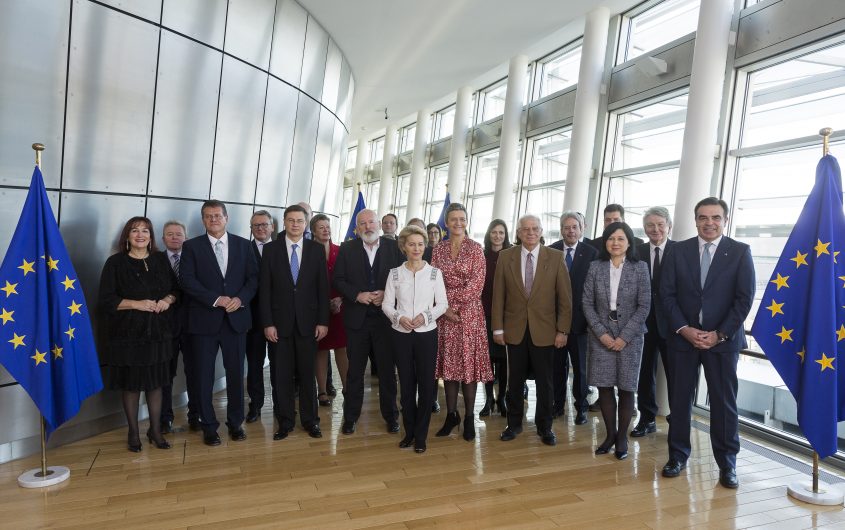
How “Geopolitical” Can the New European Commission Become?

Peter S. Rashish
Vice President; Director, Geoeconomics Program
Peter S. Rashish, who counts over 30 years of experience counseling corporations, think tanks, foundations, and international organizations on transatlantic trade and economic strategy, is Vice President and Director of the Geoeconomics Program at AICGS. He also writes The Wider Atlantic blog.
Mr. Rashish has served as Vice President for Europe and Eurasia at the U.S. Chamber of Commerce, where he spearheaded the Chamber’s advocacy ahead of the launch of the Transatlantic Trade and Investment Partnership. Previously, Mr. Rashish was a Senior Advisor for Europe at McLarty Associates, Executive Vice President of the European Institute, and a staff member and consultant at the International Energy Agency, the World Bank, UN Trade and Development, the Atlantic Council, the Bertelsmann Foundation, and the German Marshall Fund.
Mr. Rashish has testified before the House Financial Services Subcommittee on International Monetary Policy and Trade and the House Foreign Affairs Subcommittee on Europe and Eurasia and has advised three U.S. presidential campaigns. He has been a featured speaker at the Munich Security Conference, the Aspen Ideas Festival, and the European Forum Alpbach and is a member of the Board of Directors of the Jean Monnet Institute in Paris and a Senior Advisor to the European Policy Centre in Brussels. His commentaries have been published in The New York Times, the Financial Times, The Wall Street Journal, Foreign Policy, and The National Interest, and he has appeared on PBS, CNBC, CNN, NPR, and the BBC.
He earned a BA from Harvard College and an MPhil in international relations from Oxford University. He speaks French, German, Italian, and Spanish.
The new European Commission that took office in Brussels on December 1 has been heralded by its President, former German defense minister Ursula von der Leyen, as a “Geopolitical Commission.” It’s not entirely clear what she means by this idea, but in her appointment letters to the Commissioners-designate she said she wants to “better align the internal and external aspects of our work.” To do this, all commissioners—even those responsible for internal policies like justice or health—will report to her on the international ramifications of their activities.
Perhaps what von der Leyen is getting at is that greater coherence between the European Union’s domestic and foreign policies will allow it to achieve the “strategic sovereignty” that many in Europe believe the EU needs to respond to an increasingly fragmented world characterized by a rising China and a more nationalist United States.
In this context, the thinking goes, the EU can no longer rely on acting as a cheerleader for a rules-based international order to advance its interests; rather, it needs to actively promote those interests the way large nation-states like the U.S., China, Japan, or Russia do. And what enables those countries to be effective international actors is precisely the fact that they are set up to integrate diplomacy, defense, and economics, something that the EU—whose institutions must still share power in many areas with the 28 member states—is not.
While greater policy coherence is no bad thing, President von der Leyen would be doing herself and her commissioners a favor if she dropped becoming “geopolitical” as a yardstick for the EU’s success over the next five years. However well intentioned, this notion could reinforce the emerging (and false) narrative that international relations have all of a sudden become more Hobbesian—more ruthless, more zero-sum, more determined by “strategic competition” than in the past.
The problem here is that while it is true that China’s interests and ambitions may be increasingly hard to square with those of the U.S. and the EU, it is wrong to say that international relations overall have changed. Sure, the current U.S. administration likes to point to areas of conflict with Europe, as President Trump did this week at the NATO summit in the UK. But those White House assertions of conflicting transatlantic interests don’t bear scrutiny. Even more than under Presidents Bush and Obama, as their relative weight in the world declines the U.S. and the EU need to cooperate to promote their shared interests—first of all vis-à-vis China.
So while President von der Leyen is right to want to strengthen the Eurozone, have the EU take a leading role in developing norms and applications for artificial intelligence, and implement an effective EU screening mechanism for inward investment, these are all things that it would be easier for the EU to accomplish with U.S. help (or at least its forbearance).
On trade, President von der Leyen seems to recognize that. Her top recommendation for Phil Hogan, the new trade commissioner, for strengthening the EU’s global leadership is to build “a positive, balanced and mutually beneficial trading partnership with the United States.” It takes two to tango, and right now the White House appears uninterested in the trade talks under way with the EU since July 2018. As with most things trade-related in Washington, that could change on short notice, so Brussels should stay tuned.








